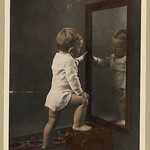LOOKING FIRST AT PRESCHOOL RELATIONSHIPS:

Copyright: highwaystarz / 123RF Stock Photo
Observing Preschoolers as they “play” taught me that there are three ways young children interact. First, there are the natural “leaders” who always come up with ideas and delegate “roles” or “tasks” to other children. Then there are the “followers” who are perfectly happy to follow along with whatever the leader delegates to them. In the third group, are the kids who can flexibly move between being a “leader” or a “follower” depending on the type of play, and the personalities of the other members of the playgroup?
Members of the third “flexible” group” have the easiest time fitting in with a new situation when it is necessary to make new friends or leave behind old friends. This is because a more “flexible” child can participate in the “give and take” that is part of forming successful relationships. A flexible child can allow another child to choose the game this time, knowing that next time it will be his/her turn.
Equally important, a more socially flexible child is perfectly happy being alone for a time, and will spend more energy figuring out which friends are the best “fit”
When we “coach” young children to have better social skills we always try to coach them into more flexibility.
AND NOW ADOLESCENT RELATIONSHIPS:
Working with preschoolers ended up to be the best possible training for understanding the complexity of adolescent relationships…especially when you add “romance” and the urgency of raging hormones into the mix.
In the same way as preschoolers, adolescents want to be a part of their peer group. They are looking to form close friendships with peers as well as more intimate relationships with opposite or same sex partners. The added pressure of sexual attraction obviously complicates the situation.
What I have found is that teenagers who were more “flexible” as preschoolers in terms of their friendship bonds, have an easier time in High School, college, and early adulthood. When a young person hits adolescence and has already had the experience of many types of relationships, as well as the experience of being comfortably alone, that person will form better and more lasting bonds. I think its because an adolescent who spends time both alone and with many types of people knows him/herself better. The question of “Who am I when I am not with you?” is more easily answered.
In short, the “flexible” preschooler has the opportunity for a more stable adolescent and adult identity. Lasting relationships are then built upon a strong sense of solid “self”
There is a lot of research out there that suggests early education is important for intellectual development, but I’d like to make the case that its also important for social and emotional development.
It can make all the difference





